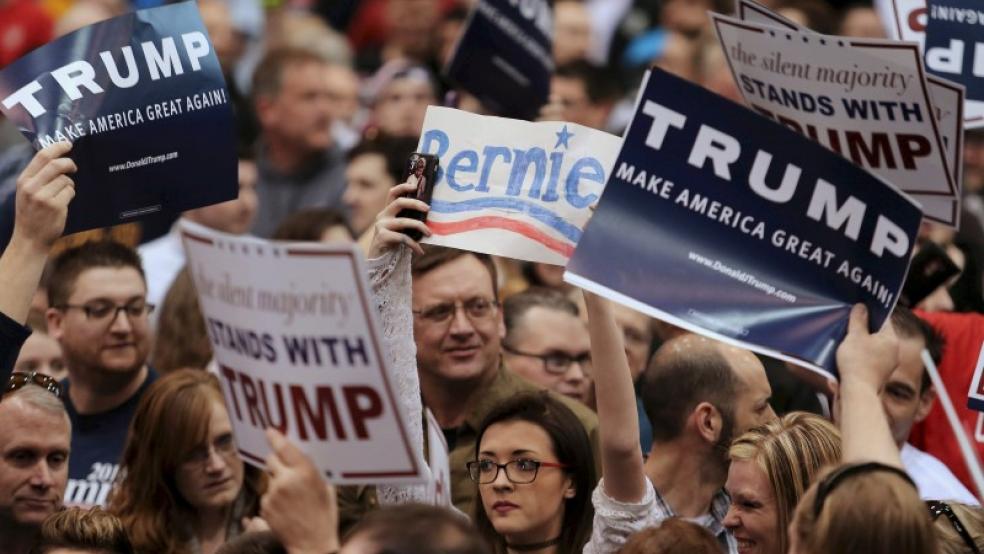In poll after poll, Americans say by a roughly two-to-one margin that the country is on the wrong track. And it’s no wonder. For decades, right-wing media have been scaring viewers, listeners and readers with tales of doom. The moral of these stories is that politically correct Democratic politicians are destroying the country and that Republicans must take all necessary steps to protect us from disaster.
Donald Trump’s surprising surge toward the GOP presidential nomination is the unintended consequence of this kind of political rhetoric and media coverage that has created a false sense of crisis in America. It’s not that everything is just peachy — but when voters come to believe that everything is broken, they are more willing to listen to outsiders like Trump who propose drastic actions that may do more harm than good.
Related: Ex-Trump Insider Says Donald Doesn’t Want to Be President
A great example was the Ebola coverage in late 2014. Conservative media outlets convinced voters that the Obama administration was hell-bent on bringing the epidemic to our shores. In the end, Ebola transmissions within the U.S. were virtually non-existent, but polls shifted toward the Republicans ahead of the 2014 mid-term elections. Mission accomplished. The damage done by the Ebola scare was thankfully limited; courageous American volunteers helped contain the outbreak in Africa and comfort victims. But exaggerations by right-wing media have had much more serious impacts in the past.
In 2002 and 2003, political leaders and the media hyped the dangers presented by Saddam Hussein’s weapons of mass destruction. Bush administration officials warned of a mushroom cloud from what turned out to be Iraq’s non-existent nuclear weapons program.
As the wisdom of the Iraq War continues to be debated, pundits usually omit the UN dimension. The Security Council had authorized inspections and had indicated a willingness to authorize force if those inspections ended unsatisfactorily. Unfortunately, President George W. Bush and Vice President Dick Cheney decided that they couldn’t wait for the inspections to end, as the risk posed by Saddam was so imminent.
They were abetted in their haste by commentators bashing the UN inspectors and demanding immediate action by the U.S. and its ad hoc coalition. Had we simply waited three months for the inspections to conclude that there were no WMDs, we could have avoided 4,500 U.S. troop deaths and 32,000 injuries. Further, we also wouldn’t be dealing with ISIS today.
Unfortunately, we do face ISIS now. And, although it does pose a threat, the media and Republican politicians have blown the risk of terrorist attacks on the homeland way out of proportion. Remember: Your odds of being killed in any kind of terrorist incident are below those of drowning in your bathtub or being struck by lightning.
Exaggerating the ISIS threat creates hostility to refugees, immigration generally and even to American Muslims. It also creates a perfect environment for a demagogue like Trump.
Related: A Trump Presidency Could Give ISIS a Foothold in the US
Much the same holds true of Republican economic rhetoric, which consistently decries the so-called Obama economy. The media chatter obscures the fact that employment has been steadily rising for the last six years and the total value of U.S. homes has rebounded from the housing crisis to reach a new record. The U.S. is outperforming most advanced economies, which are pursuing a range of economic policies.
Today’s slow growth is largely a demographic phenomenon related to population aging. Obama has not held many of the levers of economic policy since Republicans took control of the house in the 2010 mid-term elections. With divided government, much of our domestic policy is on autopilot. Undoubtedly, there are many opportunities for policy reform, but it is questionable whether the changes would add more than a few tenths of a percent to the annual increase in real GDP. Indeed, some GOP ideas — like reducing legal immigration and removing illegal immigrants — would actually reduce GDP growth.
Related: The Brutal Economic Truth Behind the Rise of Trump
But the false perception that Obama is destroying the economy and predictions of impending calamity leave voters open to dangerous ideas and the messengers who carry them — especially Trump. Threatening trade wars to extract better deals from our global partners might work, for example, but it also risks stifling commerce and ending the availability of inexpensive consumer goods.
Fearmongering over domestic security and the economy has led many voters to seek radical change. While the conservative punditocracy effectively used scary rhetoric to cement control of Congress in 2014, this approach has now backfired on the Republican establishment, which is now stuck with a loose cannon as its presumptive nominee.
Overhyping the negative for political gain is not only a practice of the Right. From the Left, we often see exaggerations of the risks posed by global warming — such as attributing an increase in hurricanes to global warming when in fact there is no clear trend toward more hurricanes. Black Lives Matter, which properly focuses attention on police brutality, still managed to cause needless rioting and looting in Ferguson, Missouri after a police shooting that the Justice Department found to be “not objectively unreasonable.” Finally, heated rhetoric around income inequality creates a false perception that millions upon millions of Americans are starving and homeless.
Related: Forget Trump — Here's Who's Really Destroying the Republican Party
An effective public policy discussion must start with an understanding that Americans in the early 21st Century are incredibly fortunate by both contemporary global standards and historical norms. The opportunities for positive, incremental change are jeopardized by the false and very dangerous perception that America is in crisis. Such misperceptions lead to elevation of candidates like Trump, whose election could make life worse for most of us.






